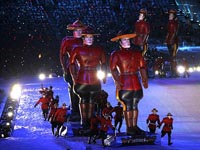Canada Passed Olympic Flag to Russia for Sochi, 2014
Canadians held the Winter Olympic Games worthily, discounting some tragedies and problems.

Opening day was overshadowed by the death of a luger in a training-run crash. The finale couldn't have been more festive — a tribute to the organizers, who persevered despite first-week setbacks, and to the Canadian team, which surged to glory after a shaky start.
A crowd of 60,000 filled BC Place Stadium for Sunday's closing ceremony, many of them Canadians reveling in the overtime victory over the United States just a few hours earlier by their men's hockey team. That win, in the games' final event and in Canada's most cherished sport, gave the host nation a Winter Olympics record of 14 gold medals and set off wild celebrations across Vancouver.
The gaiety in the stadium — capped by a rock concert with Alanis Morissette, Nickelback and Avril Lavigne — contrasted sharply with the moment of silence at the opening ceremony Feb. 12 for Nodar Kumaritashvili, the luger killed in a horrific crash on the sliding track in Whistler just hours before that ceremony.
The speakers of honor on Sunday, chief Vancouver organizer John Furlong and International Olympic Committee president Jacques Rogge, each paid tribute to the 21-year-old athlete.
"We are so sorry for your loss," Furlong said, addressing the nation of Georgia. "May the legacy of your favorite son never be forgotten and serve to inspire youth everywhere to be champions in life."
Furlong — who even tried to reach out to francophone Canada with some halting words in French — quickly shifted to a more upbeat tone.
"I believe Canadians tonight are stronger, more united, more in love with our country and more connected to each other than ever before," he said. "These games have lifted us up."
He paid tribute to moguls skier Alexandre Bilodeau, winner of Canada's first gold medal at these games.
"Alexandre, your gold medal gave us all permission to feel and behave like champions," Furlong said. "Our last one (the hockey gold) will be remembered for generations."
The stadium literally shook as fans cheered and stamped their feet in appreciation.
Rogge then pronounced the games closed, after describing them as "excellent and very friendly."
Neil Young, the durable Canadian folk-rock star, followed with a wistful version of his "Long May You Run" — and the Olympic flame faded away as he ended.
Canadian officials ensured an extra measure of poignancy at the ceremony by selecting figure skater Joannie Rochette as their flagbearer. Her mother died of a heart attack hours after arriving in Vancouver last weekend, but Rochette chose to carry on and won a bronze medal, inspiring her teammates and fans around the world.
"Yes, it's been a tough week for me," she said before the ceremony. "But I walk tonight into that stadium with a big smile on my face. ... I accomplished my goals, and I want to celebrate with my teammates."
The team was greeted with a mighty roar when they joined the fast-moving, informal parade of athletes into the stadium. Among the cheerleaders was Prime Minster Stephen Harper, wearing a Canada jacket.
The U.S. flagbearer was Billy Demong, a veteran of four Olympics who won a gold and silver medal in Nordic combined.
There were plenty of reasons for Canada and the United States to celebrate after 17 days of competition. The U.S. won 37 medals overall — the most ever for any nation in a Winter Olympics.
Canada, after a slow start, set a Winter Games record with 14 golds and sparked public enthusiasm in Vancouver that veterans of multiple Olympics described as unsurpassed.
The comeback by the Canadian athletes was mirrored by the determination of the Vancouver Organizing Committee. It struggled with a series of glitches and weather problems early in the games, adjusted as best it could, and reached the finish line winning widespread praise for an exceptional Olympics — albeit one tinged with sadness.
Right from the start of the closing show, there was a spirit of redemption as the producers made up for an opening-ceremony glitch in which one leg of the Olympic cauldron failed to rise from the stadium floor. On Sunday, the recalcitrant leg rose smoothly and former speedskating medalist Catriona LeMay Doan — who missed out on the opening-night flame lighting because of the glitch — got to perform that duty this time.
Later came the traditional handover ceremony, during which the Olympic flag was lowered and presented to the hosts of the next Winter Games in 2014.
Vancouver Mayor Gregor Robertson handed over the five-ringed flag to IOC president Jacques Rogge, who passed it on to Anatoly Pakhomov, the mayor of Sochi, Russia. That was followed by the Russian national anthem and a presentation about Sochi featuring opera, ballet, ice skating and giant glowing spheres called "zorbs."
The Associated Press has contributed to the report.
Subscribe to Pravda.Ru Telegram channel, Facebook, RSS!



